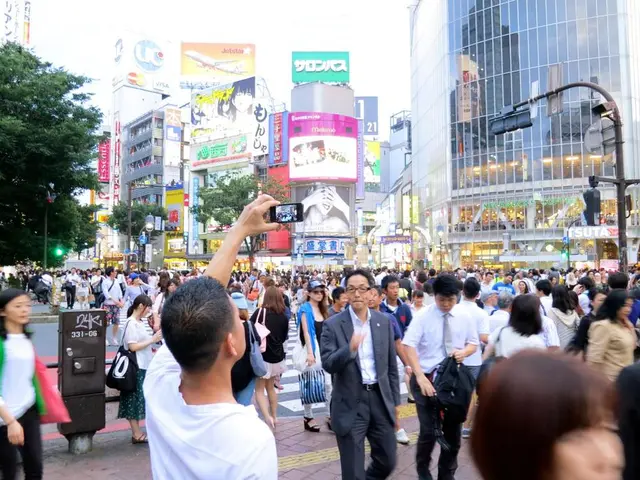Embracing the Convenience and Security of Biometric Identifiers
The increasing worth of biometric information outweighing monetary value in the near future.
Biometrics - fingerprints, facial patterns, and iris scans - offer a secure, unique method of identifying individuals. No longer just a sci-fi fantasy, biometric tech is becoming increasingly mainstream, revolutionizing how we secure our digital identities. From unlocking smartphones to verifying airport passengers, biometrics are making their way into our everyday lives.
In the competitive business landscape, biometrics hold broad appeal. Customers appreciate the simplicity of a quick scan instead of juggling multiple login details, while businesses can rest easy knowing that the intricate nature of biometric identifiers makes fraud more complex. This comforting blend of convenience and enhanced security gives biometric identifiers an economic value that rivals payment cards or cash.
Unmasking the Dark Side - Privacy Concerns and Cybersecurity Risks
While biometric data boasts unmatched security, its allure also makes it a potential goldmine for cybercriminals. Unlike compromised passwords or credit card numbers, biometric attributes cannot be easily replaced, making them a permanent liability in the event of a data breach.
The BioStar 2 breach serves as a cautionary tale. When a central biometric security platform left over a million fingerprints and facial recognition data exposed on an unprotected server, victims were left defenseless against potential identity theft.
Furthermore, the widespread use of biometric data can lead to surveillance and subtler forms of privacy invasion. With UK regulators already scrutinizing facial recognition in law enforcement and public venues, the ethical and legal boundaries around its usage will undeniably become more contested.
Biometric Black Market - A Lucrative Criminal Enterprise in the Shadows
With the escalating value of biometrics, it's no surprise that cybercriminals are capitalizing on this opportunity. On the dark web, fingerprint kits and facial recognition sets now fetch significant sums. A stolen biometric identifier is forever - unlike a canceled credit card - making these cybercriminal ventures incredibly profitable.
"Selfie with ID" packages are among the popular offerings in the criminal black market, combining photographs, personal details, and documentation used to defeating facial recognition checks used by banks, cryptocurrency exchanges, or government services. These packaged bundles command higher prices than the typical account credentials as the demand for biometric data continues to surge.
Navigating the Turbulent Waters - A Call for Regulation, Ethics, and Responsibility
Under British law, biometric data is recognized as sensitive personal information. Companies collecting such data must secure valid consent, demonstrate a clear need, and apply safeguards like encryption and limited storage to maintain data security.
Despite upholding legal constraints, companies must also prioritize transparency to prevent backlash and lawsuits. They should be forthcoming about how they gather data, who has access, and their data deletion policies. This proactive approach fosters trust among customers.
Strengthening data protection and honest communication can set companies apart in an ever-crowded marketplace. Developers using "cancellable" biometrics that allow for the invalidation of compromised data can help combat cyber threats. Firms should also alert users at once if a breach occurs, minimizing potential damage.
Reflections on the Horizon - Biometric Data: The De Facto Standard of the Future?
As biometric authentication increasingly becomes a de facto standard for everything from shopping to medical access, the dark web market for biometric data is Marching in lockstep. We can expect an arms race in which hackers continuously develop new spoofing techniques while security researchers perfect liveness detection and AI-driven fraud prevention.
On the regulatory front, UK bodies like the ICO will continue to adapt guidelines to match evolving threats while international standards, such as potential updates to GDPR, address emergent issues related to deepfakes and synthetic identities.
The future of biometrics does not have to be dystopian. If harnessed responsibly and with unwavering oversight, biometrics can significantly reduce fraud, streamline processes, and offer unprecedented convenience. With robust encryption, minimal data retention, transparent polices, and a focus on privacy by design, companies can unlock the benefits of biometric technology without compromising consumer trust. The stakes are high, but the rewards could be immense if done right.
- In light of the increasing prevalence of biometric identifiers, there is a growing black market on the dark web where fingerprint kits, facial recognition sets, and "Selfie with ID" packages are sold for significant sums, creating a lucrative enterprise for cybercriminals.
- Amidst concerns about privacy and security, general-news outlets, crime-and-justice reporters, and personal-finance experts are increasingly discussing the ethical and legal boundaries surrounding biometric technology as well as the potential risks of data breaches.
- As biometric authentication becomes standard practice in banking, cryptocurrency exchanges, and government services, technology companies and governments must prioritize security, regulation, and transparency to ensure proper use of biometric data, maintain consumer trust, and mitigate cybersecurity risks. In the face of growing challenges, it is crucial for businesses to focus on employing "cancellable" biometrics, encrypted data storage, and timely breach notifications to uphold the highest levels of digital privacy and security.








